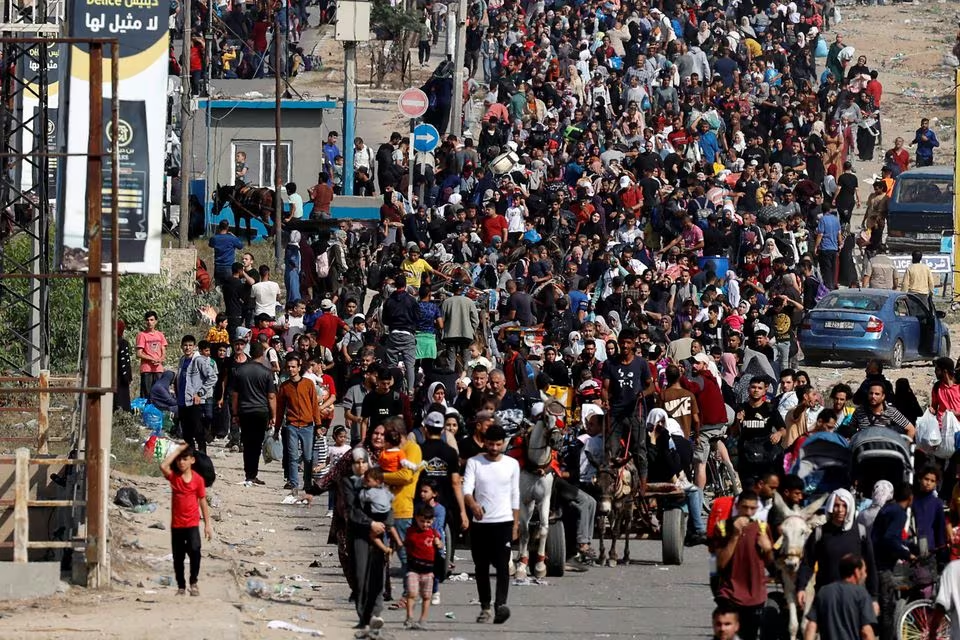
A month into Israel’s brutal bombardment of Gaza more than 9,770 people, many of them women and children, have been killed in air strikes and an intensifying ground campaign by the Israel Defense Force. The war has sent at least 1.5 million people fleeing to other parts of the territory in a desperate search for cover, but nowhere is safe for the persecuted Palestinians.
Israel forces continue to pound the besieged territory, ignoring ceasefire calls by UN aid agencies who condemned surging civilian deaths in the month-long conflict. Countries along the globe are however, divided on the situation. As some speak out against the war crimes and human rights atrocities committed by Israel, others are leaning in support of the rogue state by dubbing its crimes as attempts of ‘self-defense’.
Here is a breakdown of where all the major players of world politics stand on the issue:
- United States of America:
The United States of America does not recognize the state of Palestine and has instead offered “steadfast and united support to the State of Israel, and unequivocal condemnation of Hamas and its appalling acts of terrorism”. US officials have reiterated their unwavering support for Israel — diplomatically, financially, and militarily.
The US President, Joe Biden, has been crystal clear about his country’s position on the matter, ““We stand with Israel … And we will make sure Israel has what it needs to take care of its citizens, defend itself, and respond to this attack.”
The US has also continued its unconditional aid to Israel, which has totaled $158 billion (not adjusted for inflation) since World War II — more than the US has given to any other nation. In the wake of the current situation, the US is sending guided-missile carriers and F-35 fighters among other equipment to Israel, along with additional financial aid.
Most recently, the United States vetoed a UN Security Council resolution that would have called for “humanitarian pauses” to deliver lifesaving aid to millions in Gaza.
- United Kingdom:
The UK and Israel enjoy a close strategic partnership, with extensive defence and security cooperation to tackle shared threats, protect mutual security interests and develop stronger capabilities. For both the UK and Israel, this is one of the most important defence and security relationships, encompassing a broad range of activities.
Britain has stood shoulder to shoulder with Israel in the wake of the current situation in gaza. British Prime Minister Rishi Sunak has avoided responding to calls for him to urge the Israeli government to end "collective punishment" measures in Gaza, despite questions from lawmakers in the House of Commons. In his visit to Israel after 7 October, Sunak stated ““I am proud to stand here with you in Israel’s darkest hour.”
- United Arab Emirates
The UAE was the first Gulf country to normalise relations with Israel in 2020, breaking with decades of Arab policy toward the Palestinian cause.
The UAE has described the attacks carried out by the Palestinian Islamist faction Hamas against Israel as a "serious and grave escalation"
- Saudi Arabia
The war leaves Saudi Crown Prince Mohammed bin Salman, also known as MBS, in a difficult position. His goal of regional stability and diversifying Saudi Arabia’s economy by reducing its reliance on oil exports, has been halted by the horrific violence in Gaza and threat of a wider escalation. Saudi Arabia is putting United States-backed plans to normalize ties with Israel on ice. The conflict has also pushed the kingdom to engage with Iran.
The crown prince stated the kingdom’s “opposition to any form of civilian targeting and the loss of innocent lives” and expressed Riyadh’s “unwavering stance in standing up for the Palestinian cause”.
- Pakistan
Generally, Pakistan’s official stance on the conflict aligns with its long-standing position of not recognizing Israel as a state. For decades, Pakistan has called for the establishment of an independent Palestinian state with Jerusalem as its capital.
Pakistan’s foreign office has called for an immediate ceasefire and an end to the siege of Gaza by Israel.
- China
China did not condemn Hamas and has not designated Hamas a terrorist organisation. The initial statement coming out of China focused more on urging both sides, Israel and Hamas, to exercise restraint.
On 30 October, reports emerged suggesting that well-known Chinese mapping platforms, Alibaba and Baidu, had removed the label ‘Israel’ from their maps while keeping the names of major cities and borders intact.
Despite an official stance of neutrality, there appears to be a leaning towards the Palestinian cause
- Russia
Russia called for an immediate ceasefire, renouncing violence, and a negotiation process with international community assistance to establish lasting peace in the Middle East.
President Vladimir Putin has emphasised the “creation of an independent Palestine state with East Jerusalem as its capital” to resolve the issue.
Moscow has also refused to list Hamas as a “terrorist” organisation.
- The European Union
President of the European Commision Ursula von der Leyen has defended her closely watched trip to Israel.
An official statement by the Union has expressed steadfast support for Israel without emphasizing the need to respect international law and exercise restraint.
The President has also stated "Israel's right to defend itself against the Hamas terrorists, in full respect of international humanitarian law."


1725443747-0/Untitled-design-(5)1725443747-0-165x106.webp)














COMMENTS
Comments are moderated and generally will be posted if they are on-topic and not abusive.
For more information, please see our Comments FAQ